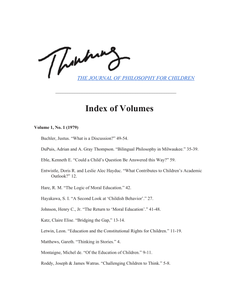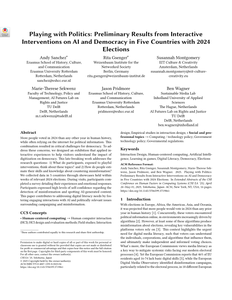Most serious games have been developed without a proper and comprehensive design theory. To contribute to the development of such a theory, this article presents the underlying design philosophy of LEVEE PATROLLER, a game to train levee patrollers in the Netherlands. This philosophy stipulates that the design of a digital serious game is a multiobjective problem in which trade-offs need to be made. Making these trade-offs takes place in a design space defined by three equally important components: (a) Play, (b) Meaning, and (c) Reality. The various tensions between these three components result in design dilemmas and trilemmas that make it difficult to balance a serious game. Each type of tension is illustrated with one or more examples from the design of LEVEE PATROLLER.
LINK
The journal was a forum for the work of both theorists and practitioners of philosophical practice with children, and published such work in all forms, including philosophical argument and reflection, classroom transcripts, curricula, empirical research, and reports from the field. The journal also maintained a tradition in publishing articles in the hermeneutics of childhood, a field of intersecting disciplines including cultural studies, social history, philosophy, art, literature and psychoanalysis.
DOCUMENT

Could a person ever transcend what it is like to be in the world as a human being? Could we ever know what it is like to be other creatures? Questions about the overcoming of a human perspective are not uncommon in the history of philosophy. In the last century, those very interrogatives were notably raised by American philosopher Thomas Nagel in the context of philosophy of mind. In his 1974 essay What is it Like to Be a Bat?, Nagel offered reflections on human subjectivity and its constraints. Nagel's insights were elaborated before the social diffusion of computers and could not anticipate the cultural impact of technological artefacts capable of materializing interactive simulated worlds as well as disclosing virtual alternatives to the "self." In this sense, this article proposes an understanding of computers as epistemological and ontological instruments. The embracing of a phenomenological standpoint entails that philosophical issues are engaged and understood from a fundamentally practical perspective. In terms of philosophical praxis, or "applied philosophy," I explored the relationship between human phenomenologies and digital mediation through the design and the development of experimental video games. For instance, I have conceptualized the first-person actionadventure video game Haerfest (Technically Finished 2009) as a digital re-formulation of the questions posed in Nagel's famous essay. Experiencing a bat's perceptual equipment in Haerfest practically corroborates Nagel's conclusions: there is no way for humans to map, reproduce, or even experience the consciousness of an actual bat. Although unverifiable in its correspondence to that of bats, Haerfest still grants access to experiences and perceptions that, albeit still inescapably within the boundaries of human kinds of phenomenologies, were inaccessible to humans prior to the advent of computers. Phenomenological alterations and virtual experiences disclosed by interactive digital media cannot take place without a shift in human kinds of ontologies, a shift which this study recognizes as the fundamental ground for the development of a new humanism (I deem it necessary to specify that I am not utilizing the term "humanism" in its common connotation, that is to say the one that emerged from the encounter between the Roman civilization and the late Hellenistic culture. According to this conventional acceptation, humanism indicates the realization of the human essence through "scholarship and training in good conduct" (Heidegger 1998, p. 244). However, Heidegger observed that this understanding of humanismdoes not truly cater to the original essence of human beings, but rather "is determined with regard to an already established interpretation of nature, history, world, and [...] beings as a whole." (Heidegger 1998, p. 245) The German thinker found this way of embracing humanism reductive: a byproduct of Western metaphysics. As Heidegger himself specified in his 1949 essay Letter on Humanism, his opposition to the traditional acceptation of the term humanism does not advocate for the "inhuman" or a return to the "barbaric" but stems instead from the belief that the humanism can only be properly understood and restored in culture as more original way of meditating and caring for humanity and understanding its relationship with Being.). Additionally, this study explicitly proposes and exemplifies the use of interactive digital technology as a medium for testing, developing and disseminating philosophical notions, problems and hypotheses in ways which are alternative to the traditional textual one. Presented as virtual experiences, philosophical concepts can be accessed without the filter of subjective imagination. In a persistent, interactive, simulated environment, I claim that the crafting and the mediation of thought takes a novel, projective (In Martin Heidegger's 1927 Being and Time, the term "projectivity" indicates the way a Being opens to the world in terms of its possibilities of being (Heidegger 1962, pp. 184-185, BT 145). Inspired by Heidegger's and VilemFlusser's work in the field of philosophy of technology as well as Helmuth Plessner's anthropological position presented in his 1928 book Die Stufen des Organischen und der Mensch. Einleitung in die philosophische Anthropologie, this study understands the concept of projectivity as the innate openness of human beings to construct themselves and their world by means of technical artefacts. In this sense, this study proposes a fundamental understanding of technology as the materialization of mankind's tendency to overcome its physical, perceptual and communicative limitations.) dimension which I propose to call "augmented ontology."
LINK
Professional higher education is expected to educate large numbers of students to become innovative professionals within a time frame of three or four years. A mission impossible? Not necessarily, according to Henriëtta Joosten who is a philosopher as well as a teacher. She uses the experimental, liberating, but also dangerous ideas of Friedrich Nietzsche to rethink contemporary higher professional education. What does it mean to teach students to strive for better in a professional world where horizons tend to disperse and the possibility of long-term orientation is disappearing? Following Nietzsche, five key elements of striving for better are explored: uncertainty, excellence, critical thinking, truth seeking friendship, and learning through ups and downs. From these five perspectives, Joosten scrutinises existing educational discourses on professional higher education in search for openings to transform these discourses into new, more appropriate ones. Understanding excellence as rising above oneself (rather than being better than others), she argues for a learning environment in which all students are encouraged to excel. Such an environment allows for uncertainty and learning through ups and downs. Furthermore, teachers are prepared to risk their certainties in order to let a joined quest - that is, a quest of students and teacher - for better truths arise. Using the Nietzschean-inspired notions which have been developed in the study, Joosten describes two factual cases. One case relates to a course in close reading: first-year students jointly read philosophical and scientific texts. The second case involves a group of eleven senior students developing a course in project management. These descriptions and the recommendations serve as a catalyst for constructive debate on the question of how all students can be equipped for a dynamic professional world.
MULTIFILE

More people voted in 2024 than any other year in human history, while often relying on the internet for political information. This combination resulted in critical challenges for democracy. To address these concerns, we designed an exhibition that applied interactive experiences to help visitors understand the impact of digitization on democracy. This late-breaking work addresses the research questions: 1) What do participants, exposed to playful interventions, think about these topics? and 2) How do people estimate their skills and knowledge about countering misinformation? We collected data in 5 countries through showcases held within weeks of relevant 2024 elections. During visits, participants completed a survey detailing their experiences and emotional responses. Participants expressed high levels of self-confidence regarding the detection of misinformation and spotting AI-generated content. This paper contributes to addressing digital literacy needs by fostering engaging interactions with AI and politically relevant issues surrounding campaigning and misinformation.
MULTIFILE

The 6th International Human Rights Education Conference is about teaching human rights. The purpose of this convention is to protect and promote the right of people with disabilities to participate equally in societal life. Implementation of the convention is a responsibility of the national government. At the Utrecht University of Applied Sciences a social work course now includes an introductory lecture on human rights using objects and a game that addresses the UN Convention on the Rights of Persons with Disabilities.
LINK
Hoofdstuk in Frontiers in Gaming Simulation. Design thinking, design methodology and design science gain much attention in the domain of gaming and simulation and their theories offer parallels to knowledge exchange in youth care services. Design science research covers context independent engineering and constructionist creativity in pursuit of general values and is built on the synthesis of what already exits and of what might be. Design thinking and design methodology address questions that show similarities to youth care problem solving and future scenario development. The core business of youth care workers is to support positive change and to develop beneficial opportunities for child-rearing. Effective knowledge exchange in networks is the key to successful intervention and simulation gaming might help to study its processes and outcomes, however, we need appropriate validation tools and methods. The author argues that the design and analytical sciences complement each other in research of network exchange. Analytical approaches might develop and test theories about knowledge acquisition and transfer, while design approaches could enhance the exchange of situational, interactional, and interventional expertise. This proposition is explored in a multiple case study in which an analysis tool has been used to structure and study knowledge exchange in youth care networks through simulation gaming.
LINK
The “Age-Friendly Cities & Communities: States of the Art and Future Perspectives”publication presents contemporary, innovative, and insightful narratives, debates, and frameworks based on an international collection of papers from scholars spanning the fields of gerontology, social sciences, architecture, computer science, and gerontechnology. This extensive collection of papers aims to move the narrative and debates forward in this interdisciplinary field of age-friendly cities and communities. CC BY-NC-ND Book CC BY Chapters © 2021 by the authors Original book at: https://doi.org/10.3390/books978-3-0365-1226-6 (This book is a printed edition of the Special Issue Feature Papers "Age-Friendly Cities & Communities: State of the Art and Future Perspectives" that was published in IJERPH)
MULTIFILE

Op 25 januari organiseerde Lectoraat De Pedagogische Opdracht een Symposium over actuele vragen in het onderwijs. Bijna 150 professionals vanuit het basisonderwijs, MBO en HBO bezochten het evenement op locatie Inholland Haarlem. Tijdens haar keynote besprak lector Mascha Enthoven actuele thema’s uit het publieke debat zoals kansenongelijkheid, persoonsvorming in het onderwijs en kwaliteit- en vrijheid van onderwijs. In de aansluitende sessies werden deze thema’s verder uitgediept en gingen deelnemers met elkaar in gesprek.
MULTIFILE
